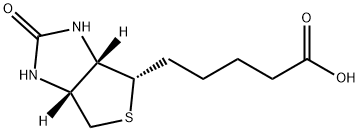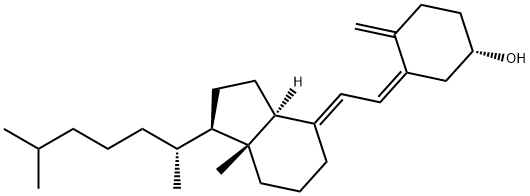A1225312
D-Biotin , 98% , 58-85-5
Synonym(s):
Biotin;Vitamin B7;Vitamin H;D-(+)-Biotin;D(+)-Biotin
CAS NO.:58-85-5
Empirical Formula: C10H16N2O3S
Molecular Weight: 244.31
MDL number: MFCD00005541
EINECS: 200-399-3
| Pack Size | Price | Stock | Quantity |
| 1G | RMB55.20 | In Stock |
|
| 5G | RMB159.20 | In Stock |
|
| 25G | RMB583.20 | In Stock |
|
| 100G | RMB2271.20 | In Stock |
|
| others | Enquire |
Update time: 2022-07-08
PRODUCT Properties
| Melting point: | 231-233 °C(lit.) |
| Boiling point: | 573.6±35.0 °C(Predicted) |
| alpha | 89 º (c=1, 0.1N NaOH) |
| Density | 1.2693 (rough estimate) |
| bulk density | 200-500kg/m3 |
| refractive index | 90.5 ° (C=2, 0.1mol/L NaOH) |
| storage temp. | -20°C |
| solubility | H2O: 0.2 mg/mL Solubility increases with addition of 1 N NaOH. |
| form | powder |
| pka | 4.74±0.10(Predicted) |
| color | White crystalline powder or fine long needles |
| PH | 4.5 (0.1g/l, H2O) |
| optical activity | [α]20/D +91±2°, c = 1% in 0.1 M NaOH |
| biological source | synthetic (organic) |
| Water Solubility | Soluble in hot water, dimethyl sulfoxide, alcohol and benzene. |
| Sensitive | Light Sensitive |
| Merck | 14,1231 |
| BRN | 86838 |
| Stability: | Stable, but light sensitive. Incompatible with strong oxidizing agents, strong bases, strong acids, formaldehyde, chloramine-T, nitrous acid. |
| InChIKey | YBJHBAHKTGYVGT-ZKWXMUAHSA-N |
| LogP | 0.861 (est) |
| CAS DataBase Reference | 58-85-5(CAS DataBase Reference) |
| NIST Chemistry Reference | Biotin(58-85-5) |
| EPA Substance Registry System | Biotin (58-85-5) |
Description and Uses
Growth factor present in minute amounts in every living cell. Plays an indispensable role in numerous naturally occurring carboxylation reactions. Occurs mainly bound to proteins or polypeptides. The richest sources are liver, kidney, pancreas, yeast, and milk. The biotin content of cancerous tumors is higher than that of normal tissue.
Safety
| Symbol(GHS) |  GHS07 |
| Signal word | Warning |
| Hazard statements | H315-H319-H335 |
| Precautionary statements | P261-P271-P280 |
| Hazard Codes | Xn |
| Risk Statements | 20/21/22-36/37/38 |
| Safety Statements | 24/25-36-26 |
| WGK Germany | 1 |
| RTECS | XJ9088200 |
| F | 8 |
| TSCA | Yes |
| HS Code | 29362930 |
| Hazardous Substances Data | 58-85-5(Hazardous Substances Data) |
| Toxicity | LD50 orally in Rabbit: > 2000 mg/kg |



![N-(6-Hydrazinyl-6-oxohexyl)-5-((3aS,4S,6aR)-2-oxohexahydro-1H-thieno[3,4-d]imidazol-4-yl)pentanamide](https://img.chemicalbook.com/CAS/GIF/109276-34-8.gif)
